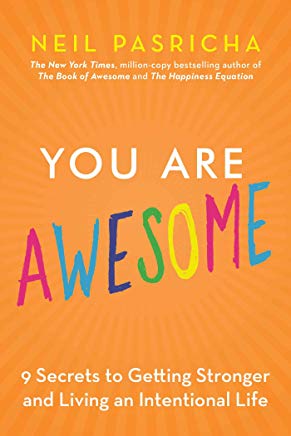You Are Awesome
9 Secrets to Getting Stronger and Living an Intentional Life
by Neil Pasricha
–Review by Teri Hyrkas
Neil Pasricha, originator of the very successful 1000 Awesome Things blog, author, podcaster, and speaker, has a new book out this month called, You Are Awesome: 9 Secrets to Getting Stronger and Living an Intentional Life. In his mixed-genre, market-savvy and abundantly creative style, Pasricha’s You Are Awesome reads like a memoir but at first glance looks somewhat like a graphic novel with its bright, high contrast, glossy cover, some illustrations that appear to be hand drawn and starburst adorned chapter divisions. Yet seen as a whole, You Are Awesome falls into the self-help book category. Happily, besides being funny, surprising, and at times abrasive, You Are Awesome is indeed helpful. Pasricha is an astute observer of culture and has in this latest offering trained his attention on one of the most painful areas of life – failure. In You Are Awesome, Pasricha offers many solid, workable suggestions meant for developing the ability to bounce back from times of defeat, becoming what he terms “resilient.”
The subtitle for You Are Awesome (Simon&Schuster, November, 2019) says it all: “9 Secrets to Getting Stronger and Living an Intentional Life.” See what he did there? Besides using the key terms “getting stronger” and “living an intentional life,” Pasricha threw in the strategic marketing word “secret” to make readers feel like they are getting special insider information — which, in truth, we are, because the author spills the beans, along with some shock-talk, about his private life. But the subtitle is also humorous and the power of humor plays as big a part in this book as does the pain of failure. Pasricha’s ability to set these opposites in relief one against the other makes this book very inviting.
The “9 Secrets” catchphrase also serves to identify the book’s chapters which include such titles as “Secret #2 – Shift the Spotlight,” “Secret #6 – Reveal to Heal,” and “Secret #8 – Go Untouchable.” Here’s a peek at the secrets:
In “Secret #2 – Shift the Spotlight,” Pasricha tells how he failed miserably in his first job out of Harvard Business School although he was handpicked and groomed for a high-paying position at a high-profile company. Pasricha acknowledges the pain of that major debacle. “I threw it all away and felt sick and horrible and disappointed and embarrassed and ashamed of myself.” (p57) He also admits that it took him ten years to see how that failure helped him – but help him it did, and in “Secret #2” he explains the process.
“Secret #6 – Reveal to Heal,” is quite intriguing. In it, the author sets forth a valuable observation: Pasricha says that today, outside of religion and psychiatric counseling, people have no one to confess to about what is weighing on their minds. Particularly in our digital culture – which, Pasricha points out, may be a contributor to loneliness in people’s lives – the sharing of soul shredding burdens is not encouraged.
The author then poses this question: “Why is confession a major part of religion?” “Because,” Pasricha tells us, “according to the Catholic Church, in addition to earning the grace of God, confession provides healing for the soul.… Yet even though confession is an incredible mental release, many of us don’t use it. Why? Well, according to the National Geographic, the world’s fastest growing religion is ‘no religion.’ “(p170)
How then, in this secular age, are we to be healed of our mental wounds other than to seek the costly services of a psychiatrist? Pasricha offers some examples and suggestions about how to participate in contemporary confession in “Secret #6.
What’s your first reaction to the word “untouchable?” Does it trigger negative or positive emotions for you? In “Secret #8 – Go Untouchable,” the author turns a concept that seems impossible and entirely negative – designating one day week wherein you are “literally, 100% unreachable in any way…by anyone,” (p223) – into an advantageous reality. Directed to those who work from a home office, the author suggests marking a day on the calendar as uninterruptible, whether by digital or personal contacts, thus making that day “untouchable.” Pasricha presents this choice as a desirable, doable, and a truly productive experience. Find this idea hard to fathom? Read “Secret #8”.
All observations and illustrations in the book, although presented anecdotally, are supported by resources cited within the text. Pasricha writes in his introduction that You Are Awesome, “[Is] a series of nine research-backed secrets, shared through personal stories….” (p xix) This makes the book very reader-friendly, but also provides the curious or serious reader with the means to follow up on specific studies.
You Are Awesome by Neil Pasricha is a self-help book whose target audience includes people who have recently graduated from college; those who are confused about their first failure in the job market; people who have experienced a failed relationship. The book is also geared toward those who believe that what is presently defined as “success” is the best of all possible goals in life. Pasricha states that success is not what the culture incessantly proclaims, and he has a very convincing and highly original way of making that known in You Are Awesome.
*A copy of You Are Awesome, Advance Reader’s Edition, was sent to me by Kalee Brown, Director of Operations at The Institute for Global Happiness, the hub for Mr. Pasricha’s marketing, writing, and social media activities. The opinions expressed in this review are my own.

